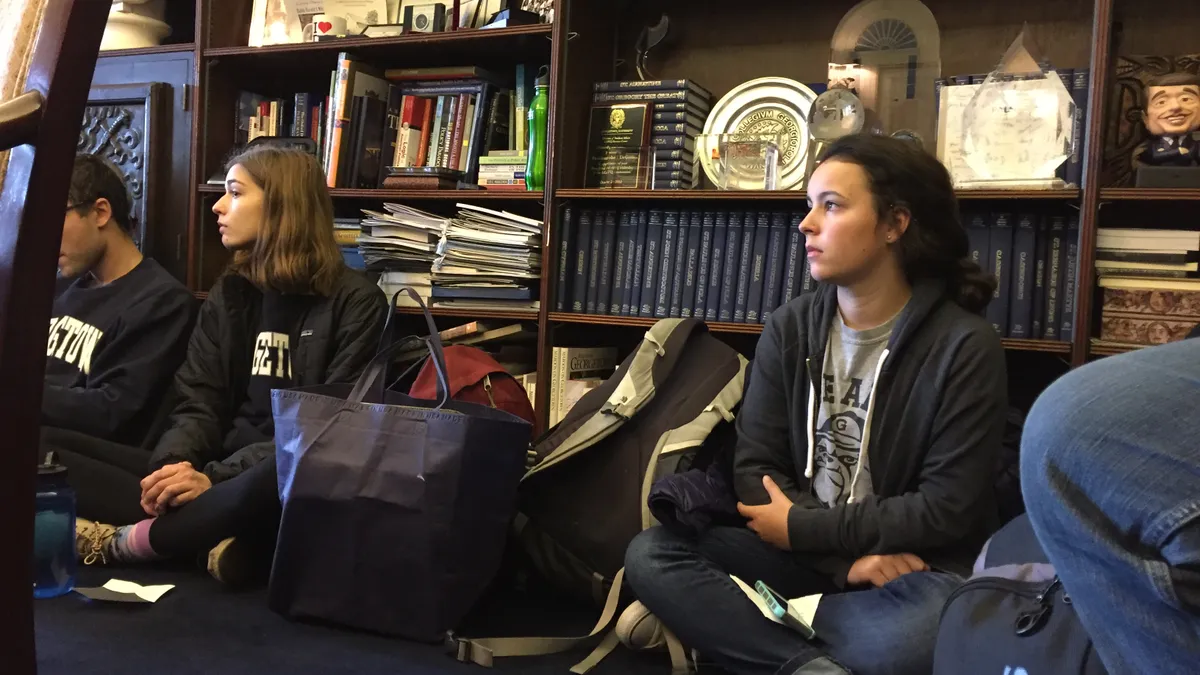Update: Georgetown University agreed to not renew its contract unless Nike signs compliance agreement.
Dive Brief:
- Recent reports of poor working conditions at a Nike contractor near Ho Chi Minh, Vietnam spurred 17 students to occupy Georgetown University President John DeGoia's office with demands the university not renew its contract with the apparel supplier.
- The demands follow a year-long movement by solidarity advocates, student athletes and various universities demanding Nike comply with university codes of conduct and produce with an eye to just labor conditions.
- Nike is the only university contract that does not comply with Georgetown's code of conduct, according to The Hoya — despite being one of the university's closest corporate partners. Nike has produced Georgetown's basketball jerseys since 1985, student-athletes wear Air Jordan brand shoes and former Georgetown basketball coach John Thompson Jr. sits on Nike's Board of Directors.
Dive Insight:
The activism at Georgetown University shows human rights abuses in the supply chain are a touch point for consumers, the perceived importance of supplier codes of conduct, and the web of insufficient audits, enabling companies the be able to hide workforce abuse.
"None of us are going to stand to allow clothing in our school store, clothing that's worn by our athletes to be made by people in 90 plus degree factory heat, in a factory where workers face harassment, in a factory where workers face forced overtime," Georgetown University student Dan Zager told Supply Chain Dive. "It's a shame, and it's an embarrassment of the university that upholds such high morals and Jesuit values would be willing to perpetuate this kind of violence and injustice."
The yearlong pressure on Georgetown University by students and its Licensing and Oversight Committee began in October, 2015, when a worker strike at Hansae Viet Nam, Nike's contractor producing university apparel, revealed the widespread abuses.
At that time, workers' rights advocates demanded that Nike sign the university code of conduct for suppliers, which would subject Nike to oversight by the university's preferred auditor - the Worker Rights Consortium. The company has yet to comply with these demands, but half a year and numerous protests later, Georgetown's president intervened via letter. Last May, Nike allowed WRC access to Hansen Vietnam without signing the code of conduct.
The results of the audit were released Tuesday, and on Wednesday students organized a sit-in with a new demand: the company should cut the contract and renegotiate it to allow the WRC full access to Nike supplier factories.
"Fourteen months ago we were open to collaboration with Nike, but the past year plus has shown that Nike is not willing to bargain in good faith with the university." Zager added. "We are demanding that Nike facilitate timely and independent access to WRC to all of its supplier factories. We want to make clear that it's not just a Hansae problem, it's a Nike problem."
Students at Georgetown University were still occupying the president's office as of 8 AM today, according to Zager. Hansae Viet Nam employs 9197 workers, 80% of which are female.
Nike's preferred auditor is the Fair Labor Association, which has previously audited Apple's plants, among others, and has been accused of being too easy on companies. Independent watchdogs have also revealed hidden violations at Uniqlo, Marks & Spencer, and Australia's fruit supply chains, despite company audits assuring labor compliance.
"Brand and retailer audits never identified and never corrected most of the serious labor rights violations taking place at Hansae," the WRC wrote in its report. "Instead, these were not uncovered until the WRC launched its investigation in October of 2015. It is hard to imagine a clearer illustration of the importance of universities’ ongoing efforts to independently monitor licensees’ labor practices."














